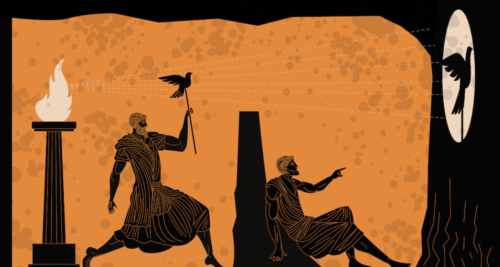Imagine you are trapped in a dark cave, chained to a wall with no way to turn your head. All you can see are the flickering shadows of objects, puppets, cast on the wall in front of you. You have never seen the objects themselves, but to you, the shadows are the only truth, your understanding of reality.
This is the “Allegory the Cave” the ancient Greek philosopher Plato presents in his work “Republic.” Plato records a dialogue between Socrates, his teacher, and Glaukon, his brother, that illustrates how people are often limited by their surroundings and by the information they receive. Just as the prisoners in the cave cannot see beyond the shadows on the wall, we too can be trapped in a distorted version of reality. Plato cautions us of the danger of accepting only what we are shown.
Every morning, I receive multiple emails from major news outlets. Articles ranging from “Kentucky Sheriff Arrested in Shooting Death of Judge” to “We Tried 8 Popular Stuffing Mixes, There Was One Clear Winner” to “The Threat of More War” flood my inbox. My understanding of the world is inevitably filtered through the lens of the media I consume. I see the world not as it truly is, but as it is presented to me – fragmented, curated and often sensationalized.
It is impossible to exist everywhere and learn firsthand everything that is happening in the world. We rely on the media to act as our eyes and ears, and to report to us truthful stories beyond our immediate surroundings. Yet, the media can distort as much as it reveals. It may sometimes prioritize stories based on what will captivate, outrage, or entertain rather than what is truly important.
About a month ago, I read an article in the New York Times by Nicholas Niarchos titled “The Dark Side of Congo’s Cobalt Rush” for my Current Events class. It describes the harsh lives of miners in the Democratic Republic of Congo, where cobalt – the essential mineral used in the batteries of smartphones, laptops and EVs – is extracted under dangerous and exploitative conditions for the profit of major technology giants.
Below is an excerpt from the article:
“After Amnesty International published a report on unethical cobalt mining, in 2016, Apple issued a statement saying that it ‘believes every worker in our supply chain has a right to safe, ethical working conditions,’ and that ‘underage labor is never tolerated.’ The following year, after a report by Sky News showed that cobalt mined by children was still being used in the company’s devices, Apple suspended purchases of hand-mined cobalt, but once the media attention died down the practice continued.”
Even when companies publicly acknowledge their involvement in unethical practices under the pressures of media scrutiny, true change remains elusive unless it is supported by genuine long-term commitments. The cycle of media outrage followed by fleeting corporate responses cannot dismantle the deep-rooted issues that sustain global supply chains. The relentless use of cobalt mined under such conditions—despite public protest and temporary actions taken by these major corporations—serves as a stark reminder of how difficult it is to escape the insidious shadows of our consumer-driven world.
The conveniences of my daily life – like the laptop on which I type this – are built on the invisible labor and suffering of others. And yet, how often do such articles break through the deluge of more frivolous or exciting news? Stories like these are the ones that hold true significance, but they require effort, both to report and to comprehend.
Plato’s narrative concludes with Socrates and Glaucon pondering what would happen if a prisoner is freed and sees the world in its true form for the first time. The journey is disorienting, even painful, but it is the only path to enlightenment. Similarly, in today’s media-saturated world, we must seek out stories that uncover the deeper issues of humanity’s interconnected existence.
As consumers of media, it is essential that we do not passively accept the information we are given as the only realities. It is not enough to solely consume what is convenient or sensational. And for journalists, there is an even greater responsibility to report on issues that matter, to bring to light stories that are vital to the human cause and to do so continuously.
The shadows on the wall will not suffice.






